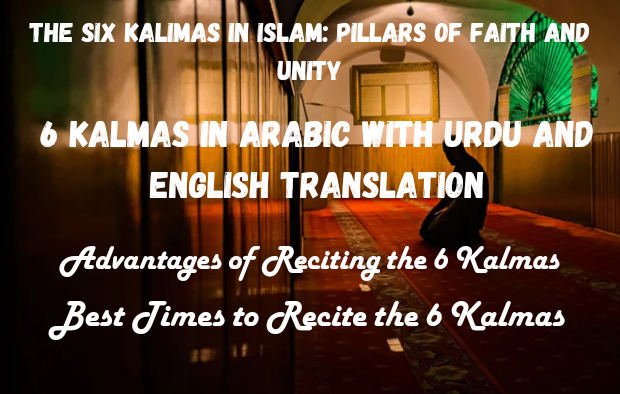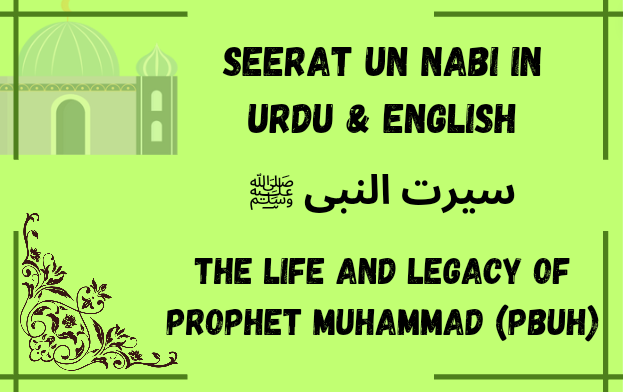6 Kalmas In Arabic With Urdu&Eng Translation
6 Kalmas In Arabic With Urdu & English Translation

The Six Kalimas in Islam: Pillars of Faith and Unity
In Islam, the Six Kalimas hold significant importance as they encapsulate fundamental beliefs and principles of the faith. Each Kalima represents a declaration of faith, unity, repentance, and glorification of Allah. Let’s delve into each Kalima
First Kalima (Tayyab):
لَا إِلٰهَ إِلَّا اللهُ مُحَمَّدٌ رَسُولُ اللهِ
“Laa ilaaha illal Lahoo Muhammadur Rasool Ullah.”
پہلا کلمہ طیبہ: اللہ کے سوا کوئی معبود نہیں اور محمد صلی اللہ علیہ وسلم اللہ کے رسول ہیں۔
First Kalima (Tayyab): There is no god but Allah and Muhammad (PBUH) is the Messenger of Allah
Second Kalima (Shahadah):
أَشْهَدُ أَنْ لَا إِلٰهَ إِلَّا اللهُ وَحْدَهُ لَا شَرِيكَ لَهُ وَأَشْهَدُ أَنَّ مُحَمَّدًا عَبْدُهُ وَرَسُولُهُ
“Ash-hadu al-laa ilaaha illal Laho Wahdahoo Laa Shareeka Lahoo Wa-Ash-hadu Anna Muhammadan ‘Abduhoo Wa Rasooluhu.”
میں گواہی دیتا ہوں کہ اللہ کے سوا کوئی معبود نہیں وہ اکیلا ہے اس کا کوئی شریک نہیں اور میں گواہی دیتا ہوں کہ محمد صلی اللہ علیہ وسلم اللہ کے بندے اور رسول ہیں۔
I bear witness that there is no god but Allah alone, with no partner, and I bear witness that Muhammad (pbuh) is His servant and Messenger.
Third Kalima (Tamjeed):
سُبْحَانَ اللهِ وَالْحَمْدُ لِلَّهِ وَلَا إِلٰهَ إِلَّا اللهُ وَاللهُ أَكْبَرُ وَلَا حَوْلَ وَلَا قُوَّةَ إِلَّا بِاللهِ الْعَلِيِّ الْعَظِيمِ
“Subhanallaahi Walhamdu Lillaahi Walaaa ilaaha illalllaho Wallahu Akbar. Wa Laa Hawla Wa Laa Quwwata Illaa Billaahi Al Aliyyil Azeem.”
اللہ پاک ہے، حمد اللہ کے لیے ہے، اللہ کے سوا کوئی معبود نہیں، اور اللہ سب سے بڑا ہے، اور اللہ کے سوا کوئی طاقت اور طاقت نہیں، سب سے بلند، عظیم ہے۔
Glory be to Allah, praise be to Allah, there is no god but Allah, and Allah is greatest, and there is no power nor strength except in Allah, the Most High, the Great.
Fourth Kalima (Touheed):
لَا إِلٰهَ إِلَّا اللهُ وَحْدَهُ لَا شَرِيكَ لَهُ، لَهُ الْمُلْكُ وَلَهُ الْحَمْدُ، يُحْيِي وَيُمِيتُ وَهُوَ حَيٌّ لَايَمُوتُ أَبَدًا أَبَدًا، ذُو ٱلْجَلَالِ وَٱلْإِكْرَامِ بِيَدِهِ الْخَيْرُ وَهُوَ عَلَى كُلِّ شَيْءٍ قَدِيرٌ
“Laaa ilaha illal Lahoo Wahdahoo Laa Shareekalahoo Lahul Mulko Walahul Hamdo Yuhee Wa Yumeeto Wa Hoa Haiy Yul La Yamooto Abadan Abada Zul Jalali Wal ikraam Beyadihil Khair. Wa hoa Ala Kulli Shai In Qadeer.”
اللہ کے سوا کوئی معبود نہیں وہ اکیلا ہے، اس کا کوئی شریک نہیں، اسی کی بادشاہی ہے اور اسی کے لیے حمد ہے، وہ زندہ کرتا ہے اور موت دیتا ہے، اور وہ زندہ ہے اور کبھی نہیں مرتا، عظمت اور عزت کا مالک ہے۔ اور اسی کے ہاتھ میں بھلائی ہے اور وہ ہر چیز پر قادر ہے۔
There is no god but Allah, He is alone, He has no partner, His is the kingdom and to Him is the praise, He gives life and gives death, and He lives and never dies, the Lord of majesty and glory. Is. And in His hand is good, and He has power over all things.
Fifth Kalima (Astaghfar)
اَسْتَغْفِرُ اللهَ رَبِّيْ مِنْ كُلِّ ذَنْبٍ أَذْنَبْتُهُ عَمْدًا أَوْ خَطَأً سِرًّا أَوْ عَلَانِيَةً وَأَتُوبُ إِلَيْهِ مِنَ الذَّنْبِ الَّذِيْ أَعْلَمُ وَمِنَ الذَّنْبِ الَّذِيْ لَا أَعْلَمُ إِنَّكَ أَنْتَ عَلَّامُ الْغُيُوْبِ وَسَتَّارُ الْعُيُوْبِ وَغَفَّارُ الذُّنُوْبِ وَلَا حَوْلَ وَلَا قُوَّةَ إِلَّا بِاللَّهِ الْعَلِيِّ الْعَظِيْم
“Astaghfirullah Rabbi Min Kulli Zambin Aznabtuho Amadan Aw Khata’an Sirran Aw ‘Alaaniyataw Wa Atubu Ilaih Minaz Zambil Lazee Aalamu Wamimaz Zambil Lazee Laaa Aalamu Innaka Anta Allamul Ghuyoobi Wa Sattaarul ‘Uyoobi Wa Ghaffaruz Zunooba Wala Haawla Wala Quwwata Illa Billahil ‘Aliyil ‘Azeem”
میں اللہ سے معافی مانگتا ہوں، میرے رب، میں نے جان بوجھ کر یا غلط، پوشیدہ یا علانیہ ہر گناہ کی معافی مانگی، اور میں اس سے توبہ کرتا ہوں اس گناہ کے لیے جو میں جانتا ہوں اور جس گناہ کو میں نہیں جانتا، بیشک تو غیب کا جاننے والا ہے۔ گناہوں کی پردہ پوشی، اور گناہوں کو معاف کرنے والا اللہ کے سوا کوئی طاقت اور طاقت نہیں ہے۔
I seek forgiveness from Allah, my Lord, I ask forgiveness for every sin, intentional or unintentional, hidden or open, and I repent to Him for the sin that I know and the sin that I do not know, Indeed, He is the Knower of the Unseen. There is no power and no power but Allah to cover sins, and to forgive sins.
Sixth Kalima (Radde Kufr)
اللَّهُمَّ إِنِّي أَعُوذُ بِكَ مِنْ أَنْ أُشْرِكَ بِكَ شَيْئًا وَأَنَا أَعْلَمُ بِهِ وَأَسْتَغْفِرُكَ لِمَا لَا أَعْلَمُ بِهِ، تُبْتُ عَنْهُ وَتَبَرَّأْتُ مِنَ الْكُفْرِ وَالشِّرْكِ وَالْكَذِبِ وَالْغِيبَةِ وَالْبِدْعَةِ وَالنَّمِيمَةِ وَالْفَوَاحِشِ وَالْبُهْتَانِ وَالْمَعَاصِي كُلِّهَا وَأَسْلَمْتُ وَأَقُولُ لَا إِلَهَ إِلَّا اللَّهُ مُحَمَّدٌ رَسُولُ اللَّهِ.
Here is the phrase “Allahumma inni a’udhu bika min an ushrika bika shay’an wa ana a’lamu bihi wa astaghfiruka lima laa a’lamu bihi. Tubtu ‘anhu wa tabarratu min al-kufri wash-shirki wal-kadhibati wal-ghibati wal-bid’ati wan-namiimati wal-fawaahishi wal-buhtaani wal-m’aasi kulliha wa aslamtu wa aqulu Laa ilaaha illAllahu Muhammadur Rasoolullah.
“اے اللہ میں تیری پناہ مانگتا ہوں اس بات سے کہ تیرے ساتھ کسی کو شریک نہ ٹھہراؤں جس کے بارے میں میں جانتا ہوں اور جس چیز کو میں نہیں جانتا اس کے لیے تیری بخشش چاہتا ہوں۔ میں نے توبہ کی اور اپنے آپ کو کفر، شرک، جھوٹ، غیبت، بدعت،اور، بے حیائی، کفر اور فسق و فجور سے بری کر دیا اور تمام گناہوں سے بری ہوگیا اور میں نے اسلام قبول کر لیا اور کہتا ہوں۔ اللہ کے سوا کوئی معبود نہیں، محمد صلی اللہ علیہ وسلم اللہ کےرسول ہیں۔
O Allah, I seek Your refuge from associating anyone with You that I know about and I seek Your forgiveness for what I do not know. I repented and absolved myself of disbelief, polytheism, falsehood, backbiting, heresy, And gossip, immorality, blasphemy and transgression and absolved from all sins and I accepted Islam and I say. There is no god but Allah, Muhammad is the Messenger of Allah.
For more Islamic Information Please click this link https://raohammad.com/20masnoon-duain-in-arabic-with-engurdu-translation/
Advantages of Reciting the 6 Kalmas
Reciting the 6 Kalmas, which encompass key beliefs and principles of Islam, offers several advantages. Here are some of the primary benefits:
- Strengthening Faith: The Kalmas are a direct declaration of faith, reinforcing a Muslim’s belief in the oneness of Allah and the Prophethood of Muhammad (PBUH). Regular recitation fosters a deeper connection to these core beliefs.
- Spiritual Growth: Repeating the Kalmas regularly helps in spiritual growth and development. It creates an atmosphere of mindfulness and connection to Islamic teachings.
- Repentance and Forgiveness: The Kalmas contain elements of seeking forgiveness and repentance. This provides a way for Muslims to seek Allah’s forgiveness for sins and renew their commitment to avoiding wrongdoings.
- Unity and Belonging: The recitation of the Kalmas unites Muslims worldwide, creating a sense of community and common purpose. This can provide comfort and a sense of belonging to the broader Islamic Ummah.
- Spiritual Defense: The Kalmas can act as a spiritual shield against disbelief and external threats, reinforcing a Muslim’s resolve to stay on the right path and avoid harmful influences.
Reciting the 6 Kalmas helps Muslims remain grounded in their faith, seek forgiveness, and strengthen their spiritual connection to Islam. It is an essential part of many Muslims’ daily spiritual practices and serves as a reminder of the fundamental tenets of Islam.
Best Times to Recite the 6 Kalmas
The 6 Kalmas are a significant part of Islamic belief and are often recited as part of daily spiritual practice. Here are some of the best times to recite the 6 Kalmas:
- After Every Prayer: Reciting the Kalmas after each of the five daily prayers can strengthen faith and deepen one’s connection to Allah.
- Upon Awakening and Before Sleeping: Starting and ending your day with a recitation of the Kalmas is a way to focus on Islamic teachings and seek spiritual guidance.
- When Seeking Forgiveness: The 5th and 6th Kalmas are particularly useful when seeking forgiveness and repentance from Allah, making them ideal to recite when seeking spiritual cleansing.
- During Times of Stress or Distress: Reciting the Kalmas during moments of anxiety or distress can bring comfort and reaffirm one’s faith, providing a sense of reassurance and spiritual support.
- In Moments of Reflection or Spiritual Growth: The Kalmas can be recited during moments of personal reflection or when seeking to strengthen your faith and spiritual growth.
In summary, the 6 Kalmas can be recited at various times throughout the day to strengthen faith, seek forgiveness, and bring comfort.
It’s important to choose times that are meaningful to you and align with your spiritual goals.
Also Follow us on Instagram https://www.instagram.com/makeupstore2166?igsh=OGQ5ZDc2ODk2ZA==














2 comments